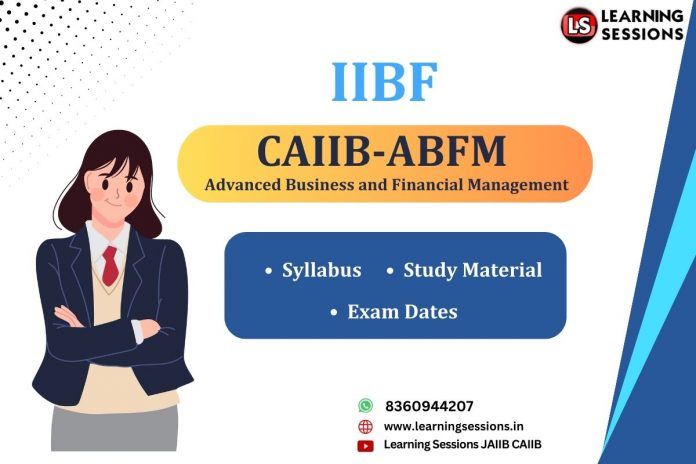Advance Business and Financial Management (ABFM) is the third paper of CAIIB compulsory papers. Candidates who are appearing in the CAIIB exam must consider this article for the CAIIB ABFM exam pattern, syllabus, and study material to start their preparation.

📚 CAIIB Study Resources 📚
👉 Check Here
👉 Check Here
👉 Check Here
👉 Get Tests Here
👉 Check Here
👉 Click Here
👉 Click Here
CAIIB Bank Financial Management (BFM) Paper Pattern
Number of questions -100
Marks – 100
Duration – 2 hours
CAIIB ABFM Exam dates 2024
14th July 2024
08th December 2024
CAIIB Syllabus: CAIIB Compulsory Subjects
Paper 1: Advanced Bank Management (ABM)
Paper 2: Bank Financial Management (BFM)
Paper 3: Advanced Business and Financial Management (ABFM)
Paper 4: Banking Regulations and Business Laws (BRBL)
CAIIB Syllabus: CAIIB Elective Subjects
1. Rural Banking
2. Human Resources Management
3. Risk Management
4. Central Banking
5. Information Technology and Digital Banking
CAIIB ABFM Syllabus 2024
CAIIB ABFM paper-3 consists of 4 modules. The syllabus of all four modules is discussed below–
Module A
MODULE A: THE MANAGEMENT PROCESS
|
|
|
Chapters
|
Topics |
|
Basics of Management |
Definition of Management, The Management Process, Functions of Management, Importance of Management, Management Thoughts & Approaches, Management Challenges & Opportunities, Introduction to Strategic Management, Business Environment Analysis. |
|
Planning |
Fundamentals of Planning, Steps in Planning, Importance of Planning, Advantages and disadvantages of planning, Management by Objectives, Plan Components, Contingency planning, Forecasting & Decision Making. |
|
Organizing |
Introduction and Fundamentals of Organizing, Importance of Organisation, Stages in Organising Process, The Organising Process, Principles of organizing, Types of Organisations, Organisation structure, Organisation charts and manuals, The Organisation culture, Authority & Responsibility, Key Issues in Organisation Structure, Organisational Change, Conflict Dynamics. |
|
Staffing |
Functions of Staffing, Objectives of staffing, Nature of staffing, Facets of staffing, Significance of staffing, System approach to staffing, Recruitment, Selection, Training, Retention and development, Knowledge and learning management, Performance Appraisal, and Human Resource Development. |
|
Directing |
Characteristics of directing, Importance of directing, Elements of directing, Leadership, Motivation, Communication, Supervision. |
|
Controlling |
Basics of Controlling, Characteristics of controlling, Advantages of controlling, Limitations of controlling, Types of control management, Control process, Relation between planning and control, Control Techniques, Control technique and Information Technology. |
Module B
MODULE B: ADVANCED CONCEPTS OF FINANCIAL MANAGEMENT
|
|
|
Chapters
|
Topics |
|
Sources of Finance and Financial Strategies |
Equity Capital, Internal Accruals, Preference Capital, Term Loans, Debentures, Alternative Financing Strategies in the Context of Regulatory Requirements |
|
Financial and Operating Leverages |
Financial Leverage, Degree of Financial Leverage and its Behaviour, Operating Leverage, Degree of Operating Leverage and its Behaviour, Combined or Total Leverage |
|
Capital Investment Decisions |
Objectives of capital investment decisions, Estimation of project cash flows, Forecasting and its relation to regulation of capital for short-, medium- and long-term periods, Relationship between sales, production and other functional budgets, Cash Forecasts, Cost analysis for projects, Methods of Investment appraisal; Social Cost Benefit Analysis |
|
Capital Budgeting for International Project Investment Decisions |
Foreign Investment Analysis, Special Considerations-Foreign & Home Currency Cash Flows, Foreign Currency Discount Rates Computation, International Portfolio Investment and Institutional Constraints, Direct and Indirect Channels for International Portfolio Investment, Exchange and Country Risk, Return and Risk of Foreign Investment, Capital asset pricing model, Arbitrage pricing theory; International Capital Budgeting Issues involved in overseas projects, Approaches for evaluation of overseas projects, Evaluation methods, Impact of transfer pricing |
|
Adjustment of Risk and Uncertainty in Capital Budgeting Decision |
Sources & Perspectives on Risk, Sensitivity Analysis, Scenario Analysis, Hillier Model, Simulation Analysis, Decision Tree Analysis, Corporate Risk Analysis, Managing Risk, Project Selection Under Risk, Risk Analysis in Practice |
|
Decision Making |
Decision Making using Cost-Volume-Profit (CVP) Analysis, Decision Making using Relevant Cost Concepts, Decision Making using Activity Based Costing, Ethical and Non-Financial Considerations Relevant to Decision Making |
Module C
MODULE C: VALUATION, MERGERS & ACQUISITIONS
|
|
|
Chapters
|
Topics |
|
Corporate Valuations |
Approaches to Corporate Valuation, Adjusted Book Value Approach, Stock and Debt Approach, Direct Comparison Approach, Discounted Cash Flow Approach, Steps involved in valuation using DCF Approach, |
|
Discounted Cash Flow Valuation |
Estimating Inputs, Approaches to Discounted Cash Flow Models, Various discounted Cash Flow Models, Dividend Discount Model, Applicability of the Dividend Discount Model, |
|
Other Non-DCF valuation models |
Relative valuation model, Equity Valuation Multiples Model, Enterprise value multiples Model, Choosing the right multiples, Book value approach Model, Stock and debt approach |
|
Special cases of valuation |
Intangibles –Brand, Human valuation etc., Real estate Firms, Start-up firms, Firms with negative or low earnings, Financial Service companies, Distressed firms, Valuation of cash and cross holdings, Warrants and convertibles, Cyclical & non-cyclical companies, Holding companies, E-commerce firms |
|
Mergers, Acquisitions and Restructuring |
Types of Transactions, Reasons for Merger, Mechanics of a Merger, Costs and Benefits of a Merger, Exchange Ratio in a Merger, Purchase of a Division / Plant, Takeovers, Leveraged Buyouts, Acquisition Financing, Business Alliances, Managing Acquisitions, Divestitures, Holding Company, Demergers Deal structuring and financial strategies Negotiations, Payment and legal considerations, Tax and accounting considerations, Tax reliefs and benefits in case of Amalgamation in India, Financial reporting of business combinations, Deal Financing, Financing of cross border acquisitions in India |
Module D
MODULE D: EMERGING BUSINESS SOLUTIONS |
|
|
Chapters |
Topics |
|
Hybrid Finance |
Advantages and disadvantages of Hybrid securities, Types of hybrid securities, Preference Share Capital, Features of Warrants, Features of Convertible Debentures, Differences between Warrants and Convertible debentures, Valuation of Warrants, Valuation of Compulsorily Convertible (Partly or fully) Debentures, Objective of issuing Warrants and Convertible debentures, Features of Foreign Currency Convertible Bond (FCCB), Mezzanine Financing, Innovative Hybrids. |
|
Start-up Finance |
Benefits to startup under the Startup Plan, Startup definition in India, Challenges faced by Startups, State Startup Policy, Pitch Presentation, Programmes and competitions for startups, Tax exemptions, Funding, Investor’s outlook in Startups, Funding schemes and programmes, International challenges and bridges. |
|
Private Equity and Venture Capital |
Characteristics of Venture Capital Investments, Characteristics shared by Private Equity and Venture Capital as well as their key distinctions, Financing options available through Venture Capital, Investment in Private Equity, Benefits obtained through private equity, Drawbacks to the practice of private equity, Due diligence, Exit Strategies. |
|
Artificial Intelligence |
History of Artificial Intelligence, Applicability of Artificial Intelligence, Artificial Intelligence in Banking and Finance, The future scope of Artificial Intelligence, Neural Networks, Control Theory and Cybernetics, Rational Agents, Motion and Manipulation, Tools and Techniques of Artificial Intelligence, Artificial Intelligence and Morality. |
|
Business Analytics as a Management Tool |
Essentials of Business analytics, Types of Analytics, Elements of Business Analytics, Big Data Analytics, Web and Mobile Analytics, Comparing web Vs Mobile Analytics, Importance of Business Analytics. |
|
Green and Sustainable Financing |
ISO Standards for Green Finance, Building Green Finance, International Best Practices towards Green Finance, Public Policy in India, Progress of Green Finance in India, Challenges and way forward, Growth of Regulatory Framework, National Efforts towards Green and Sustainable Financing, RBI Views on Climate Risk and Sustainable Finance. |
|
Special Purpose Acquisition Company |
Advantages of SPAC, Disadvantages of SPAC, SPAC Formation and Timelines, The SPAC Merger, Stakeholders, Characteristics of SPACs, Process, SPAC Capital Structure, Trust Account, Warrants, Forward Purchase, IPO Agreements, De-SPAC Process. |
CAIIB ABFM Study Material 2024
IIBF will conduct CAIIB ABFM Paper-3 on 14th July 2024 and 08th December 2024. Candidates must start preparation for the paper by utilising quality study material.
CAIIB ABFM Pdf Notes
Our CAIIB ABFM paper PDF notes are prepared by the experts and are well-organised and prepared focusing on the comprehensive coverage of all concepts/topics. The notes are prepared with an up-to-date syllabus enabling candidates to prepare and achieve success for the paper.
CAIIB ABFM Mock Tests
Chapter-wise Mock tests prepared by Learning Sessions provide candidates with a real exam experience and familiarize them with exam patterns, question types, and time management strategies. In addition, by attempting mock tests candidates can check their performance level and accordingly can give more focus to required areas/topics.
YouTube videos
For the comprehensive preparation of candidates, our experts regularly upload CAIIB videos on our YouTube channel. These videos are prepared with topics related to the CAIIB exam syllabus with explanations and tips to help candidates in their CAIIB preparation journey.
By subscribing to our channel and watching these videos, candidates can access high-quality content and enhance their understanding of the real exam.
CAIIB ABFM Demo Videos
So ending this article by saying that aspiring candidates are recommended to prepare the CAIIB ABFM paper with effective study material, along with study routines, and consistency in preparation to succeed in the CAIIB ABFM paper and advance their careers in the banking sector.
Also Like:





